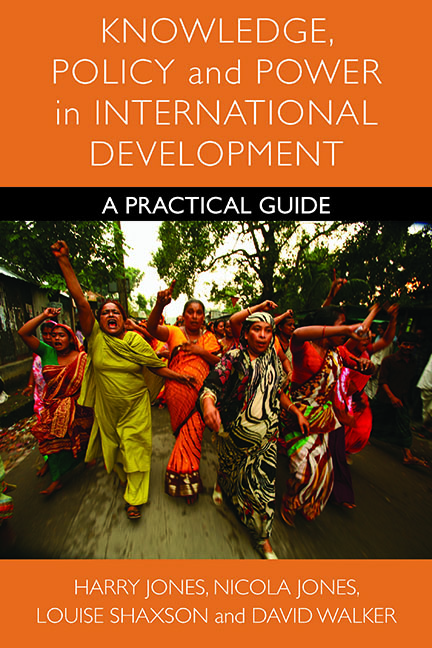Book contents
- Frontmatter
- Contents
- List of tables and figures
- List of acronyms
- Glossary
- Acknowledgements
- one Navigating the Knowledge–Policy Landscape
- two Mapping political context
- three Engaging actors
- four Integrating different types of knowledge
- five Facilitating knowledge interaction
- six Conclusion and policy implications
- References
- Index
two - Mapping political context
Published online by Cambridge University Press: 01 September 2022
- Frontmatter
- Contents
- List of tables and figures
- List of acronyms
- Glossary
- Acknowledgements
- one Navigating the Knowledge–Policy Landscape
- two Mapping political context
- three Engaging actors
- four Integrating different types of knowledge
- five Facilitating knowledge interaction
- six Conclusion and policy implications
- References
- Index
Summary
Political economy approaches have gained considerable currency in development circles in recent years. Somewhat surprisingly, however, given the recognised importance of the ‘knowledge economy’ in shaping development trajectories, this approach has paid little attention to the intersection of knowledge, policy and power. A key objective of this chapter, therefore, is to review the more useful conceptualisations of political context as mapped in various state-function typology and process frameworks. This in turn underpins a model to map varied political contexts and implications for the knowledge–policy interface that, we argue, can be applied to development realities and practice. The ultimate aim is to promote a more coherent response to the gaps and strengths in political context that affect how knowledge is used in policymaking. Such an approach is especially important given that much of the thinking and scholarship on the knowledge– policy interface has focused on developed country contexts; relatively limited attention has been paid to the mediating variables of political context that are often very different in the developing world.
By the end of this chapter, readers will be able to answer the following questions:
• How do I begin to disaggregate ‘political context’ into more manageable components that are both analytically robust and useful for looking at the knowledge–policy interface?
• How can I analyse the knowledge–policy dynamics of political context factors, including:
» the separation of state powers between the legislature and the executive;
» electoral processes and other types of formal political participation;
» the informal types of political relationship that take place outside of mainstream policy processes;
» the type and magnitude of supranational or external forces at play; and
» the capacity of political institutions to absorb change?
The chapter first focuses on approaches to understanding political contexts, looking at various frameworks that have been used in the past before settling on a hybrid approach combining insights from both state typology and state function frameworks, which, we argue, are key to understanding how political context affects the production, translation and use of knowledge. A third section digs deeper to analyse our hybrid framework's implications for theory and practice at the knowledge–policy interface.
- Type
- Chapter
- Information
- Knowledge, Policy and Power in International DevelopmentA Practical Guide, pp. 13 - 46Publisher: Bristol University PressPrint publication year: 2012



